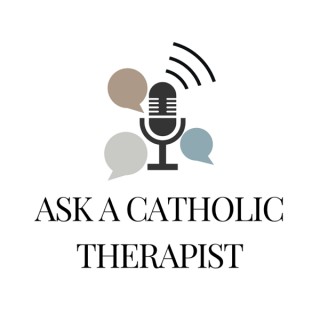Ask A Catholic Therapist
Follow Ask A Catholic TherapistWeekly Q&A sessions with Dr. Matthew Breuninger.
- Nov 15, 2022 LATEST EPISODE
- monthly NEW EPISODES
- 17m AVG DURATION
- 18 EPISODES
Latest episodes from Ask A Catholic Therapist

Should you go out for a glass of wine with the ladies? Take that fishing weekend with the guys? Buy yourself that coffee and bag that you've always wanted? Get a massage? The answer is maybe. Self-care is about recognizing that you are a creature made of mind (psychology), body, and spirit. That means that to care for yourself you must attend to each of these areas so that you can function to the best of your ability within your vocation. Often we confuse self-care with treating ourself. Self-care doesn't always feel good; isn't always immediately enjoyable or easy. It is, however, what we need. So, maybe I don't need the latte, but actually need to exercise or take time to journal. Or, maybe I need that latte or a massage (because I've been neglecting my body). It depends. The point is, self-care is not just about doing what feels good or is enjoyable, but it's about doing what helps you finely tune the instrument (that's you!) that God is using to bring salt, light, and leaven to the world.

Episode 15: Interview with Sister Faustina, author of Jesus I Trust in You: A 30-day Retreat with the Litany of Trust
Jesus wants us to us to trust Him, but sometimes trust is hard. Sometimes our own wounds and hurts make it difficult to trust our Lord. As Jesus invites us deeper into trust, he allows our old walls and self-sufficiencies to come crumbling down. This can be so painful, but it's a real mercy because we are being drawn into a deeper trust in Him. Sr. Faustina, author of the Litany of Humility and Sister of Life, describes how she came to write the Litany and discusses the importance of trusting our Lord. Purchase Sister Faustina's book here: https://stpaulcenter.com/product/jesus-i-trust-in-you-a-30-day-personal-retreat-with-the-litany-of-trust/

Episode 14: How to Cope with your Spouse's Impurity, An interview with Moral Theologian Dr. Irene Alexander
In this episode we interview Dr. Irene Alexander, a moral theologian and relationship coach. Dr. Alexander and I discuss: How to deal with the pain caused by a spouse's sexual sin. -How to foster intimacy and emotional connection when you've been hurt by your spouses impurity. -The different desires men and women have and how failing to communicate openly about these desires can cause problems. Check out Dr. Alexander's relationship coaching program: https://adoredforlife.com

We discuss 10 common thought errors (or cognitive distortions) that cause us problems. These errors prevent us from seeing the world accurately and cause us to respond in disproportionate or irrational ways.

In this episode we discuss cognitive-behavioral therapy. We examine what it is, how it works, and why it works.

In this episode, Dr. B discusses how you might determine whether it's time to find a new therapist. I cover evaluating your relationship with the therapist as well as your progress.

In this episode, we talk about four areas or indicators (emotional, psychological, social, and physical) that might suggest a need to see a professional.

We discuss the freedom and the two types of freedom that God gives us on this side of the Beatific vision.

In this episode, Dr. B discusses what positive psychology is, the principles that underpin it, and two exercises that have been shown to boost mood and increase well-being.

It's easy enough to feel inadequate to the task of being a father. We need only present ourselves, the entirety of our poverty, to the Father and He will multiple our humble offering to be enough.

In this episode, Dr. B discusses what mindfulness is and whether all mindfulness practices necessarily import the intentions of Eastern religion/philosophy. I also talk about Catholic's tendency to assume the body is bad.

In this episode, Dr. B. discusses whether there is a Catholic therapy that best fits a Catholic vision of the human person. We also talk about the common factors model of psychotherapy.

Episode 6: Effective Listening, Part 3, Teaching Your Children Effective Listening
In the third part of this series on effective listening, Dr. B highlights a big mistake parents often make and discusses two means for helping children learn how to listen well: modeling and teachable moments.

Episode 5: Effective Listening Series, Part 2, Seven Obstacles to Effective Listening
In this episode, we discuss seven obstacles to effective listening (e.g. transference, focusing on ourselves, and more). Learning about these obstacles can help you be a better listener, as you come to recognize how they are cropping up in your life.

Episode 4: Effective Listening Series, Part 1, Four Tips for Effective Listening
In this episode, we discuss what effective listening is and how we can practice being better listeners to others.

In this episode, we discuss forgiveness and a few simple methods for beginning the process of forgiving someone.

Ask A Catholic Therapist Ep. 2: The Chemical Imbalance Myth? Explaining the Causes of Mental Health
Discussion of the chemical imbalance hypothesis and introduction to the biopsychosocial model for understanding mental health and mental illness.**Disclaimer: Information on this channel and in this episode is not intended to be professional or psychological advice. This channel and these episodes are intended for educational purposes only. If you are experiencing a mental health issue it is important to seek out the appropriate professional help--Crisis Text Line --741741; National Suicide Prevention Lifeline- 1(800) 273-8255**SHOW LESS

How to support someone who has been diagnosed with a mental illness and may also be experiencing a crisis of faith.








